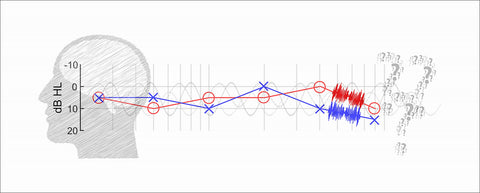
4 Myths about Tinnitus
In modern society, more and more people are suffering from tinnitus.
Tinnitus often affects the everyday life, work, and rest of patients, causing them to be physically and mentally exhausted, so tinnitus issues have always been of great concern.
However, it is heartbreaking that some of the knowledge about tinnitus on the Internet is misleading, both in alarmist claims and exaggerated treatment effects.
Is tinnitus a severe disease?
Tinnitus is annoying. It affects daily work, study, and life and may make people anxious, depressed, and even have light thoughts of life.
We need to know that tinnitus is not a disease but a symptom and a prevalent one.
Data from epidemiological surveys show that about 15 to 20% of the general population has tinnitus. In other words, there are probably more than a billion tinnitus sufferers worldwide!
Although tinnitus brings us a lot of trouble, it does not mean that we cannot enjoy life with tinnitus.
It is essential to keep a sound mind and a positive attitude.
Will tinnitus lead to deafness after a long time?
There are many causes of tinnitus, and most tinnitus patients cannot find any apparent reason.
When various ear diseases cause tinnitus, the deafness will gradually increase as the disease progresses.
Tinnitus caused by hypertension, hyperlipidemia, and hyperglycemia, which affect the blood supply to the inner ear, can also cause hearing damage over time.
However, tinnitus caused by other conditions such as anemia, cervical spondylosis, thyroid disease, neck plaque, heart disease, etc., generally does not cause deafness.
Tinnitus caused by one's own emotions or psychological stress also generally does not cause deafness.
Therefore, tinnitus does not necessarily make you deaf. If you spend all day wondering if you will be deaf, you are doing more harm than good to tinnitus treatment.
However, if you have tinnitus, it is advisable to consult a hearing professional because tinnitus is often accompanied by hearing loss.
Can tinnitus be cured by cutting the auditory nerve?
Tinnitus is one of the problematic ear conditions, and many times doctors can only say. There is nothing that can be done.
So some people start to look for some unclinically proven treatments on the Internet.
For example, some people claim that tinnitus patients can treat tinnitus by cutting the auditory nerve.
However, tinnitus is not like a toothache. Cutting the auditory nerve will only cause you to lose your hearing and still hear the sound of tinnitus.
Therefore, many treatments on the Internet are unreliable, and you should still follow your doctor's advice and listen to him or her.

Is there any medication that can cure tinnitus?
The mechanism by which tinnitus occurs is still unclear. There is still no FDA-approved specific drug or specific treatment.
Some medications can help reduce the severity of tinnitus and help manage the behavioral disorders associated with this condition. However, it is essential to understand that these medications will not eliminate tinnitus.
For example, many patients experience increased tinnitus when they are anxious. Some medications can reduce anxiety, but these medications will not treat tinnitus.
